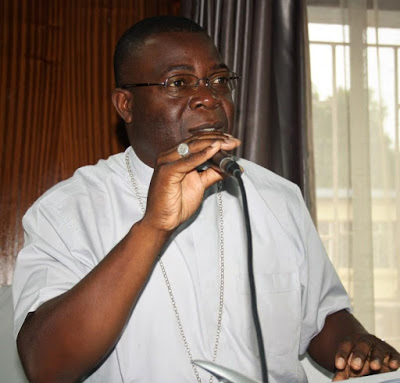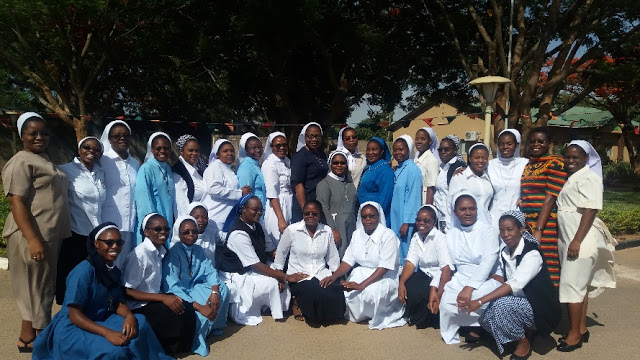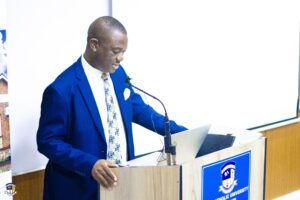ZAMBIA: ZCCB Applauds Sisters’ Association on its Diamond Jubilee

Rt. Rev. Patrick Chisanga, ZCCB National Director for the Religious
The Zambia Conference of Catholic Bishops (ZCCB) has appreciated the role that the Zambia Association of Sisterhoods (ZAS) has played in spread the Gospel of Jesus Christ through integral evangelisation.
National Director for the religious Bishop Patrick Chisanga has acknowledged that the sisters have made it possible to evangelize the whole person through provision of quality education, health care, pastoral care, care of the most vulnerable children especially those with disabilities and many other initiatives that they have initiated throughout the country since their foundation in 1958.
Bishop Chisanga who is also Bishop of Mansa Diocese has observed that the sisters have willingly offered themselves in far flung hard-to-reach areas and have completed the pastoral care that the religious men are carrying out at the Spiritual, physical and intellectual level.
“The sisters take care of the neglected and the forsaken whom society looks at as taboo and they have given life, skills and hope for living,” he said adding that “many outstanding people in the society will also testify that they have gone through a Mission school run by sisters and these have made a huge difference in society,” the Bishop said.
He further elaborated that the history of the Catholic Church in Zambia could not be complete without the Religious Sisters, “We are really grateful and appreciate the Zambia Association of Sisterhoods for their presence in the country for the past sixty (60) years. We will forever remain indebted to them for their commitment.”
The Bishop explained that the arrival of the first male missionaries was immediately followed by the coming of the women missionaries. These women missionaries were dotted everywhere in Northern Rhodesia and immediately started recruiting the African sisters among them. These missionaries initiated the formation of the then Association of Northern Rhodesia comprising only of 225 sisters from 14 Congregations scattered in different Centers which later came to be known as the Zambia Association of Sisterhood (ZAS). This initiative to form ZAS sixty years ago showed collaboration and enhanced evangelisation.

The Franciscan Missionaries of Divine Motherhood (FMDM) were in Balovale and Mankoya land, the Holy Cross Sisters (H.C) in Lukulu, Katima Mulilo and Sichili, the Maramba Sisters (Franciscans) were under Livingstone Vicariate while the Irish Religious Sisters of Charity (I.R.S.C) were in Chikuni. The Little Servants of Mary Immaculate were in Kasisi while the Dominicans Sisters of the Sacred Heart of Jesus (O.P) were in Broken Hill under Lusaka Vicariate and in Ndola Vicariate at St Teresa’s Mission Ibenga in Luanshya. The Association of St John the Baptist were in Fort Rosebury in Kabunda and Lubwe under the White Sisters (MSOLA). The White Sisters were also at St Teresa in Chilubula, Kasama, as well as in Fort Jameson Vicariate in Minga and Kanyanga.
“A lot has changed in Zambia and I would urge the sisters to re-discern and correctly interpret the signs of time because we are in an information, communication and technology (ICT) era and the sisters should not lag behind. It is important that as they plan the years ahead they should be fully aware of this,” Bishop Chisanga advised.
ZAS was formed with the aim to promote greater dialogue and cooperation between the Sisterhoods in various fields of apostolates so as to improve the individual and collective contributions to the service of the ecclesiastical authorities. Bishop Chisanga has urged the sisters to continue empowering themselves with integral formation by looking at the meaning of the Consecrated life and vows in a modern Zambian way.
“The formation program which is being offered at Kalundu Study Centre should step up and critically look at issues such as secularism, individualism and relativism and other social vices of the modern world, hence the need for prudence and restraint on the part of the sisters’ lifestyle,” Bishop Chisanga counselled adding that “The sisters should also endevour to adopt modern ways of caring for disabilities by embracing inclusion of people and not institutionalization. The children with disabilities should learn with other children so that other children can learn to work with them as well.”
The Bishop also challenged the sisters to take up theological studies so that they could teach in seminaries and give quality assistance in Pastoral care of God’s people.
He also commended the sisters in their conscientisation programmes on the Care of Mother Earth, our Home. He said the sisters should continue educating people not to use charcoal as fuel but encourage replanting of trees, good disposal of waste material and discourage the use of Plastic bags.
In addition, he recommended that ZAS should continue working together with ZCCB, traditional leaders and government in collaboration, training, ongoing formation in order to be effective in their deliverance of their programmes.
∽End∽
By Srs. Beatrice Mwansa, (D.O.R) and Helen Kasaka, (LSMI)


